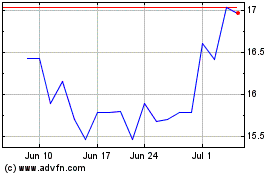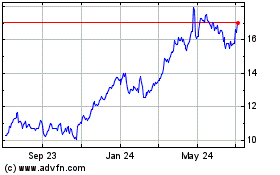Deutsche Bank: What to Know
September 30 2016 - 5:06PM
Dow Jones News
By Georgi Kantchev
Deutsche Bank AG this week endured questions about whether it
would raise capital, whether the German government would come to
its aid and whether it was losing the confidence of the market as
some hedge funds dialed back their business with the bank. Its
stock fell to fresh lows, only to rebound Friday to end the week up
1.4%. Its share-price decline of nearly 50% this year has rippled
through financial markets and hit other European banks, already
beset by the continent's weak economy and negative interest rates.
Here's a look at the German bank's troubles.
Why is Deutsche Bank so important?
By many accounts, the bank is too big to fail. With EUR1.8
trillion ($2.02 trillion) in assets, Deutsche Bank is Germany's
biggest bank and one of the world's largest lenders. It has more
than 101,000 employees. The International Monetary Fund said in
June that the bank is the biggest contributor to systemic risk
among large lenders, because it is so connected to others.
What's the latest trouble?
Clients getting scared, and the potential for a fine from the
U.S. Justice Department. The latest share-price volatility followed
questions about the likelihood that Germany would help the bank as
well as reports that clients, including several large hedge funds,
have pulled billions of dollars from the bank. The scrutiny
followed a Wall Street Journal report that the U.S. Justice
Department could demand Deutsche Bank pay $14 billion to settle a
series of high-profile mortgage-securities cases. The bank says it
expects ultimately to pay far less, and the settlement might not be
entirely a cash payment. Still, if Deutsche Bank has to write a big
check to the U.S. government, that eats into its capital
cushion.
Any other issues?
Yes, plenty. Europe is a difficult place for a bank these days.
The European economy is sluggish and interest rates are painfully
low, making it difficult to turn a profit on the core business of
making loans. What's more, Germany is a fiercely competitive
retail- and business-banking market. There is a proliferation of
state savings banks that aren't as motivated by profit and thus
push down prices for banking services. Deutsche Bank, of course, is
also a global investment bank -- and it has faced stiff competition
in core investment-banking businesses from American rivals. Earlier
this year, Deutsche's U.S. banking unit failed the Federal
Reserve's annual "stress tests," because of Fed concerns about its
ability to measure risks. It was the second year in a row the
German bank flunked.
How has the market reacted?
Badly. Deutsche Bank shares have dropped nearly 50% this year,
about twice as much as the Stoxx Europe 600 Banks index. Debt
issued by the bank has sold off while the cost to protect against a
default by the bank, as measured by its five-year credit-default
swaps, is hovering near its highest levels since the depth of the
European debt crisis in 2011.
What's the solution?
That is the billion-dollar question. Deutsche Bank has plenty of
cash to satisfy skittish customers who want to leave, and it has
access to loads more through the European Central Bank, which
offers loans on extremely permissive terms. But a stiff fine, or
the prospect of more losses, could erode its capital and require it
to seek more. The declining stock price makes raising capital more
painful -- each new share you sell brings in less money. It is also
not clear who would buy in to the bank at this point. The European
Union has strict rules about state aid to companies. The bank,
which has already fired thousands of employees, might need to cut
some more costs and sell assets.
Is Deutsche Bank creating another Lehman moment?
Not yet. In 2008, Lehman Brothers failed in large part because
panicked hedge funds pulled out their money, helping to trigger the
worst financial crisis since the Great Depression. Unlike Lehman,
Deutsche Bank has a far more diversified client base, spread among
German retail banking and multiple institutional business lines.
Perhaps most important, the Frankfurt-based lender also has access
to the European Central Bank, which makes cheap loans available to
banks and has provided them in copious amounts during and after the
eurozone's debt crisis.
--Mike Bird contributed to this article.
(END) Dow Jones Newswires
September 30, 2016 16:51 ET (20:51 GMT)
Copyright (c) 2016 Dow Jones & Company, Inc.
Deutsche Bank Aktiengese... (NYSE:DB)
Historical Stock Chart
From Mar 2024 to Apr 2024

Deutsche Bank Aktiengese... (NYSE:DB)
Historical Stock Chart
From Apr 2023 to Apr 2024
